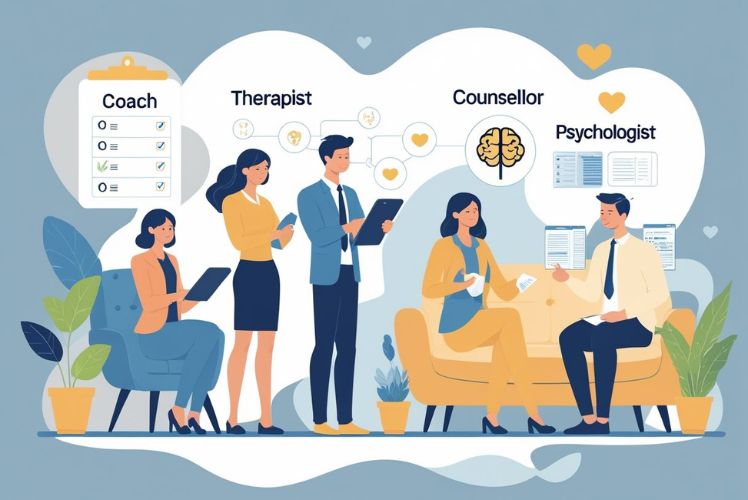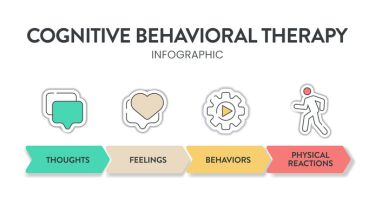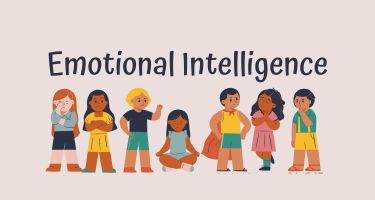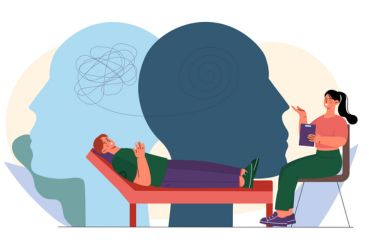When it comes to seeking help for our mental health or personal growth, we often hear about coaches, therapists, counsellors, and psychologists. Each of these professionals offers unique support, with specific training and different approaches to helping us improve our wellbeing. Understanding what sets these roles apart can make it much easier for us to find the right fit for our needs.

Some focus on mental health and emotional issues, while others help us set and achieve goals or build new skills. The differences can be confusing, but knowing who does what will help us feel more confident when reaching out for support.
Key Takeaways
- Coaching, therapy, counselling, and psychology are distinct roles with different focuses.
- Each professional has unique training and ways of helping us.
- Knowing these differences helps us choose the best support for our needs.
Overview Of Key Roles In Mental Health And Coaching

There are several types of professionals who help us with our mental health and personal growth needs. Each role has its own unique focus, skills, and methods for supporting people.
Defining A Coach
A coach is someone who supports us in setting and reaching our personal or professional goals. Coaches often focus on motivation, skills-building, and personal development. Their approach is usually present- and future-focused rather than exploring our past.
Coaching is not about giving direct advice or solving deep emotional problems. Instead, coaches help us identify our strengths and make plans to reach our aims. They can specialise in areas like life coaching, career coaching, or health coaching.
A coach does not diagnose or treat mental health illnesses. If we want support for managing mental health conditions, we should seek help from a different professional. Coaching can work well for people wanting to grow, make changes, or overcome obstacles in their lives.
Key Features of Coaching:
| Focus Area | Coaching |
|---|---|
| Main Goal | Achieving personal/professional aims |
| Typical Approach | Action-oriented, goal-driven |
| Quality Required | Motivation, openness |
| Common Settings | Private sessions, workplaces |
Defining A Therapist
A therapist helps us deal with thoughts, feelings, and behaviours that may be causing distress or holding us back. Therapists are trained in different forms of psychotherapy such as cognitive behavioural therapy (CBT) or talking therapies.
The main goal is to help us understand ourselves, address emotional pain, or change unwanted patterns. We might go to a therapist for anxiety, depression, trauma, or simply to improve our mental wellbeing.
Therapists can have various backgrounds. Some are psychologists, some are counsellors, and some have specialist psychotherapy training. Therapists usually follow strict ethical codes and may be registered with a professional body.
They create a safe space for exploring emotions, relationships, and life challenges. Therapy can be short- or long-term, depending on our needs.
Defining A Counsellor
A counsellor provides support and guidance when we need to talk through problems or difficult situations. The aim is often to help us cope with grief, stress, relationship problems, or life transitions.
Counselling is usually more focused on our current situation than deep analysis of our past. It provides a non-judgemental, confidential space where we are listened to and supported. Counsellors may use different therapeutic techniques, usually in a shorter time frame than therapy.
They do not offer diagnosis or medication. Counselling often suits those looking for help with day-to-day struggles or support during tough times.
Types Of Issues Suiting Counselling:
- Bereavement and loss
- Relationship or family stress
- Work and career concerns
- Mild anxiety or low mood
Defining A Psychologist
A psychologist studies the mind and behaviour. Some psychologists provide direct mental health support, often using evidence-based psychological therapies.
There are different types of psychologists, for example, clinical, counselling, and educational psychologists. Clinical psychologists assess, diagnose, and treat mental illnesses and psychological problems. They use talking therapies and may work in hospitals, clinics, or private practice.
Psychologists have advanced degrees and training. They use scientific methods to understand how we think, feel, and behave. Psychologists may handle more complex mental health conditions or carry out research.
Unlike psychiatrists, psychologists in the UK do not prescribe medication. Their work focuses on psychological treatments, assessment, and supporting our mental wellbeing.
Differences Between Coach, Therapist, Counsellor, And Psychologist

Each role—coach, therapist, counsellor, and psychologist—serves different needs in mental health and personal growth. Understanding their training, methods, and professional standards helps us know what support we may need in various situations.
Educational Backgrounds
Coaches often complete short-term training programmes or certificates that focus on coaching skills and motivation. These can last from a few weeks to a year. Most do not require a university degree in psychology or counselling.
Therapists include many professionals, such as psychotherapists or clinical social workers. They usually have at least a master’s degree in their field. Many study areas such as psychology, social work, or mental health counselling.
Counsellors often have a bachelor’s or master’s degree in counselling. They complete supervised placements as part of their training. As with therapists, counsellors learn about human behaviour and different counselling techniques.
Psychologists have the highest education requirements. A chartered psychologist usually holds a doctoral degree (PhD or PsyD). Their education covers assessment, diagnosis, and evidence-based mental health treatment. Some psychologists specialise in CBT (cognitive behavioural therapy), among other approaches.
| Role | Typical Education | Key Requirement |
|---|---|---|
| Coach | Certificate/training | No degree required |
| Counsellor | Bachelor’s/Master’s degree | Accredited training |
| Therapist | Master’s (varied fields) | Supervision/clinical placements |
| Psychologist | Doctorate in psychology | Extensive clinical training |
Approaches And Techniques
Coaches use goal-setting, motivation, and accountability tools. They focus on helping us achieve specific personal or professional targets. Their work is forward-looking and solution-focused. Mental health treatment is not a primary aim.
Therapists may use various approaches, such as CBT, psychodynamic therapy, or person-centred counselling. They aim to help us understand, process, and cope with emotional or psychological difficulties.
Counsellors offer talk-based support. They help us explore thoughts and feelings, make decisions, and manage stress. Counselling is often short-term and focuses on resolving specific concerns.
Psychologists employ scientific methods. Their work can include conducting assessments, developing treatment plans, and providing therapies like CBT. They are trained to diagnose mental health conditions and may use structured, research-based techniques.
Focus Areas And Scope
Coaches mainly work with personal goals, career development, and general well-being. Their clients do not have to have a mental health issue. Coaching does not address psychological disorders.
Therapists support those experiencing mental health challenges such as anxiety, depression, or trauma. They help us gain insight and develop coping strategies.
Counsellors often work with issues like relationship stress, grief, or life transitions. Their support is practical and focused on immediate concerns.
Psychologists can assess, diagnose, and treat a broad range of mental health disorders. Their work sometimes overlaps with other mental health professionals, but they provide in-depth assessments and long-term treatment plans.
| Role | Main Focus | Examples |
|---|---|---|
| Coach | Goals and performance | Career guidance, life skills |
| Counsellor | Support and decision-making | Grief, relationship problems |
| Therapist | Mental health treatment | Depression, trauma recovery |
| Psychologist | Assessment and diagnosis | OCD evaluations, psychological testing |
Regulation And Professional Bodies
Coaches are less strictly regulated than other roles. Many belong to professional bodies, such as the International Coach Federation (ICF), but membership is not legally required.
Counsellors in the UK may join the British Association for Counselling and Psychotherapy (BACP) or other ethical organisations. Registration often depends on holding specific qualifications and adhering to codes of practice.
Therapists may register with several professional bodies, depending on their field. For example, the UK Council for Psychotherapy (UKCP) or the British Association for Behavioural and Cognitive Psychotherapies (BABCP) for CBT practitioners.
Psychologists must be registered with the Health and Care Professions Council (HCPC) in the UK. Many are also members of the British Psychological Society (BPS), which sets high standards for practice.
| Role | Regulation Level | Example Body |
|---|---|---|
| Coach | Voluntary/varied | ICF, EMCC |
| Counsellor | Professional registers | BACP, NCS |
| Therapist | Professional registers | UKCP, BABCP |
| Psychologist | Legal requirement (HCPC) | HCPC, BPS |
Roles And Responsibilities In Supporting Well-Being

Supporting well-being means taking on different roles to help people with emotional problems, life changes, or mental health disorders. We need to use the right methods and skills to match each person’s needs for support, motivation, or recovery.
Supporting Emotional Difficulties
When people face emotional difficulties like anxiety or depression, we help them in various ways. Counsellors and therapists often use talking therapies to explore feelings and find healthy ways to cope. Psychologists offer assessments and structured interventions such as cognitive behavioural therapy (CBT).
We listen without judgment and help others express feelings safely. Our main aim is to reduce distress and improve daily functioning. Coaches, while not treating mental health disorders, can help people handle stress and build confidence.
Key skills:
- Active listening
- Empathy
- Problem-solving
Addressing Personal Growth And Motivation
For personal growth and increased motivation, coaching is a common approach. Coaches help clients set clear goals, identify barriers, and develop actionable plans for positive change. This can include improving health habits, building self-esteem, or achieving career milestones.
Therapists and counsellors may also support growth by tackling past issues holding people back. Psychologists might use evidence-based tools to measure progress and motivate change.
We empower clients to build resilience and take control of their personal development. The focus is often on practical steps and self-management.
| Role | Method | Focus |
|---|---|---|
| Coach | Goal-setting, feedback | Motivation, growth |
| Therapist | Exploration of barriers | Self-understanding |
| Psychologist | Behavioural interventions | Measurable change |
Responding To Trauma And Mental Health Disorders
When someone experiences trauma or has a mental health disorder, our responsibilities change. Psychologists and therapists deliver specialised treatments for trauma, such as trauma-focused CBT or EMDR. They handle complex issues including severe anxiety, PTSD, and depression.
Counsellors can provide a safe space for clients to talk and begin the healing process. In more severe mental health cases, psychologists may work with psychiatrists or doctors to coordinate support and care.
We prioritise safety, confidentiality, and evidence-based practice. Our goal is to support recovery, reduce symptoms, and help each person regain stability in their lives.
Assessment, Diagnosis, And Treatment Approaches

Understanding the roles of coaches, therapists, counsellors, and psychologists requires a close look at how each handles assessment, diagnosis, and treatment. Their involvement depends on their training, qualifications, and the needs of their clients.
Psychological Testing And Assessment
Assessment is the process of gathering information to understand a person's problems, strengths, and needs. Psychologists use a range of standardised tools, such as questionnaires, interviews, and behavioural observations.
Some psychologists carry out psychological testing to measure aspects like intelligence, memory, mood, and personality. These tests must be reliable, valid, and used appropriately.
Counsellors and therapists use assessment primarily through informal approaches, such as clinical interviews and self-report measures. They observe behaviours and listen to clients' stories to uncover patterns and challenges.
Coaches may assess practical goals, habits, and performance but do not use formal psychological tests. Their assessments are oriented towards goal achievement and personal development rather than diagnosis.
Diagnosis Of Mental Health Conditions
Diagnosis involves identifying and naming a mental health condition based on assessment findings and clinical criteria. In the UK, only qualified professionals, like clinical psychologists and psychiatrists, are authorised to make formal mental health diagnoses.
Diagnoses often rely on the DSM-5 or ICD-11, which list symptoms and criteria for various psychological disorders, such as depression, anxiety, or bipolar disorder.
Counsellors and therapists usually do not diagnose. Instead, they focus on providing support and interventions for issues such as relationship problems, stress, or low mood.
Coaches do not diagnose mental health conditions, and if they notice serious psychological symptoms, they should refer clients to appropriate professionals.
Treatment Modalities And Interventions
Treatment for mental health conditions differs across roles. Psychologists and therapists use evidence-based interventions such as cognitive behavioural therapy (CBT), psychodynamic therapy, or person-centred therapy.
They build treatment plans tailored to each client's needs, often adjusting approaches as new information emerges through ongoing assessment.
Counsellors tend to use talking therapies and supportive listening, helping clients explore feelings and develop coping skills.
Coaches use structured strategies like goal-setting, accountability, and feedback to help clients achieve personal or professional aims.
Psychiatrists, while not typically providing therapy themselves, may prescribe medication as part of treatment for psychological disorders.
Working together, these professionals ensure clients receive the most suitable support for their mental health condition or personal development goals.
Medication Management And Specialist Support
Choosing the right specialist is important, especially when we are dealing with mental health disorders such as PTSD or personality disorders. Some professionals can prescribe medication, while others focus on therapy or provide support in different ways.
Psychiatrist Versus Psychologist
A psychiatrist is a medical doctor trained in mental health. This means they can diagnose, prescribe medication, and manage physical symptoms linked to mental illness. Psychiatrists often treat complex disorders like schizophrenia, bipolar disorder, PTSD, or severe personality disorders where medication might be needed.
A psychologist, in contrast, is not a medical doctor. Psychologists are experts in talking therapies and psychological testing. They can diagnose mental health disorders and provide evidence-based treatments like cognitive behavioural therapy (CBT), but they usually do not prescribe medicines in the UK.
Key differences:
| Professional | Can diagnose? | Can prescribe? | Focus |
|---|---|---|---|
| Psychiatrist | Yes | Yes | Medication, therapy |
| Psychologist | Yes | No | Therapy |
Medication Prescribing And Management
Medication management is offered mainly by psychiatrists and sometimes by certain GPs or psychiatric nurses under supervision. This includes:
- Assessing if medication is needed for our mental health disorder.
- Prescribing the right medicine and dose.
- Monitoring side effects and making changes if needed.
Mental health conditions like severe depression, PTSD, and some personality disorders can sometimes improve with medication. We need regular check-ins to make sure the treatment is working. Therapists, counsellors, and coaches do not prescribe medication. They may, however, encourage us to discuss medication with our doctor if symptoms are not improving.
When To Consider Referral Or Combined Support
If therapy and lifestyle changes are not enough, or if symptoms are severe, we might need specialist support. Some signs that referral is needed include:
- Ongoing suicidal thoughts.
- Hallucinations or delusions.
- Severe mood swings that don’t get better with therapy.
- Complex PTSD or personality disorders that do not respond to talking therapies alone.
Combined support can mean seeing both a psychiatrist for medication and a psychologist for therapy. Our care team may also work with GPs and nurses. Good communication between different professionals helps us get the best possible treatment for our individual needs.
Choosing The Right Professional For Your Needs
When we look for support with mental health treatment or personal development, it is important to understand what type of help we need. Each role—coach, therapist, counsellor, and psychologist—offers something different, so it’s important to choose based on our goals, situation, and preferences.
Factors To Consider
We should start by thinking about what issues we want to address. If we are struggling with specific mental health conditions like anxiety, depression, or trauma, a psychologist or therapist with clinical training might be best. They have qualifications to diagnose and treat mental health disorders.
If our concerns relate more to life stress, relationship problems, or emotional support, a counsellor may be more appropriate. Counsellors usually focus on talk therapies and support for everyday challenges.
For those focused specifically on personal growth, motivation, or achieving life goals, a coach might be the right fit. Coaches do not treat mental illness but can help with career guidance, confidence building, and setting clear, achievable goals.
Other important factors include cost, location (face-to-face or online), and availability. We should also check the credentials and experience of the professional to make sure they’re properly qualified and registered.
Matching Services To Your Goals
It helps to clearly define what we hope to achieve before choosing a professional. Here’s a simple guide:
| Goal | Best Professional |
|---|---|
| Managing or diagnosing mental illness | Psychologist/Therapist |
| Coping with life changes or loss | Counsellor/Therapist |
| Achieving business or personal goals | Coach |
| Need for medication | Psychiatrist (not listed) |
| Long-term behavioural change | Psychologist/Therapist |
We can use this table to map our needs to the right type of help. For example, if we want help with depression or trauma, seeking a psychologist makes sense. If we want support reaching career goals, a coach may be more suitable.
Accessing Mental Health And Coaching Support
There are several ways to connect with mental health or coaching professionals. Many offer both in-person sessions and online appointments, which can increase flexibility.
We can use trusted directories, GP recommendations, or workplace schemes to find qualified therapists or counsellors. For coaching, we should look for accredited coaches with a clear track record and transparent client reviews.
Some charities and NHS services provide free or low-cost mental health support. For those seeking private coaching or therapy, it’s important to discuss fees upfront and ensure the support style matches our preferences. We can also request an initial meeting to see if the professional is a good fit for us.
Frequently Asked Questions
We often come across confusion about different mental health roles and when to seek help from each one. Understanding the distinctions helps us make better decisions about mental health support and possible career choices.
What are the key differences between a counsellor and a psychologist in the UK?
Counsellors usually focus on helping us manage specific issues, such as stress or relationships. Their work often involves short-term support and guidance. Counsellors may hold diplomas or degrees in counselling but do not diagnose mental health conditions.
Psychologists in the UK study human behaviour and mental processes in greater depth. They hold advanced degrees and are registered with the Health and Care Professions Council (HCPC). Psychologists can offer assessment, diagnosis, and treatment for a range of mental health issues, including complex problems.
When should one consider seeing a psychotherapist rather than a counsellor?
We might see a psychotherapist if we have long-standing or deep-rooted emotional difficulties. Psychotherapists often work with people who experience more complex or chronic problems, such as trauma or personality issues.
Counsellors are generally suited to helping with specific problems or when we want short-term support. If we’re looking for more in-depth work or want to explore patterns from our past, a psychotherapist may be more appropriate.
What distinguishes a clinical psychologist from a counselling psychologist?
Clinical psychologists often assess and treat serious mental health conditions, such as depression, anxiety disorders, or psychosis. Their training focuses on working in healthcare settings, using various assessment tools and therapy methods.
Counselling psychologists tend to address life problems, relationship issues, and less severe mental health concerns. They help us improve wellbeing and manage stress or change. Both types are regulated and highly trained, but their focus areas and client needs typically differ.
How do therapy roles vary among coach, therapist, counsellor, and psychologist?
Coaches guide us towards achieving specific life or career goals. They do not offer therapy or diagnose mental health conditions.
Therapists is a broad term and can include counsellors, psychotherapists, and psychologists who help us manage emotional or psychological issues. Counsellors often focus on support and guidance for daily problems, while psychologists provide more in-depth assessment and treatment.
In what situations is it appropriate to consult an occupational psychologist?
We would see an occupational psychologist if we want to improve workplace wellbeing or address job-related challenges. They assist individuals, teams, and organisations with stress, conflict, performance, and organisational change.
People facing work-related stress, poor working relationships, or the need for career development can benefit from their expertise. Occupational psychologists use evidence-based methods to boost performance and satisfaction at work.
What pathways exist for pursuing careers in psychology within the UK?
To become a psychologist in the UK, we typically need a degree in psychology accredited by the British Psychological Society. After our degree, we must complete further postgraduate study and supervised practice, depending on our chosen specialty.
For roles like clinical or counselling psychologist, we must register with the HCPC. Continuous professional development is required for maintaining registration and keeping up with the latest practices.





















